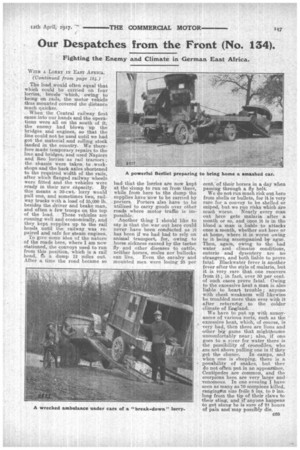Our Despatches from the Front (No. 154).
Page 19

If you've noticed an error in this article please click here to report it so we can fix it.
Fighting the Enemy and Climate in German East Africa.
WITH A LORRY IN EAST AFRICA.
(Continued from page 124.) The load would often equal that which could be carried on four lorries., beside which, owing to being on rails, the motor vehicle thus mounted covered the distance much quicker.
When the Central railway first came into our hands and the operations were all on the south of it, the enemy had blown up the bridges and engines, so that the line could not be used until we had got the material and rolling stock landed in the country. We therefore made temporary repairs to the line and bridges, and used Napiers and lteo lorries as rail tractors ; the chassis were taken to workshops and the back axles shortened to the required width of the rails, after which flanged railway wheels were fitted and the vehicles were ready in their new capacity. By this means a 30-cwt. lorry would pull one, and sometimes two, railway trucks with a load of 35,000 lb. beside a the driver and brake man, and often o, few troops on the top
of the load. These vehicles are running well and economically, and they kept supplies up to the rail heads until the railway was repaired and safe for steam engines.
To give some idea of the nature of the roads here, where I am now stationed, the convoys used to run from this position, which is a rail head, ro a dump 12 miles out. After a time the road became so
had that the lorries are now kept at the dump to run on from there, while from here to the dump the supplies have now to be carried by porters. Porters also have to be utilized to carry goods over other roads where motor traffic is MIposeible.
Another thing I should like to say is that the war out here could never have been conducted as it has been if we had had to rely on animal transport, for, owing to horse sickness caused by the tsetse fly: and other diseases to cattle, neither horses, mules nor bullocks can live. Even the cavalry and mounted men were losing 25 per
cent. of their horses in a day wlin passing through a fly belt. We do not run much risk out here from shells or bullets, for it is very rare for a convoy to be shelled or sniped, but we run risks which are much worse. Nearly every man out here gets malaria after a month or so, and Once it is in the blood a man is liable to attacks once a month, whether out here or at home, where it is worse owing to it being accompanied by ague. Then, again, owing to the had water and climatic conditions, enteric and dysentery are no strangers, and both liable to prove fatal. Bla,ckwater fever is another fever after the style of malaria, but it is Very rare that one recovers from it ; in fact, over 50 per cent. of such cases prove fatal. Owing to the excessive heat a man is also liable to heart trouble ; anyone with cheat weakness will likewise be troubled more than ever with it after returning to the colder climate of England. We have to put up with annoyances of various sorts, such as the excessive heat,. which, of course, is very bad, then there are Eons and other big game that mightkeome uncomfortably near ; also, if one goes to a river for water there is the possibility of crocodiles, who ; are not above pulling one in if they
get the chance. In camps, and when one is sleeping, there is a possibility of snakes, but they ; do not often put in an appear:thee. . Centipedes are common and the scorpions here are very large and venomous. In one evening I have seen as many as 70 scorpions killed, rangingem size from 5 ins. to 9 ins. long from the tip of their claws to their sting, and if anyone happens to get stung he is sure of 24 hours of pain and 'may possibly die. c59






















